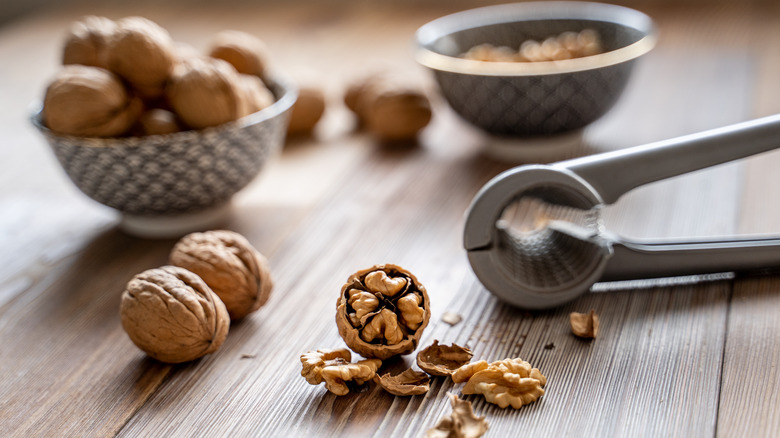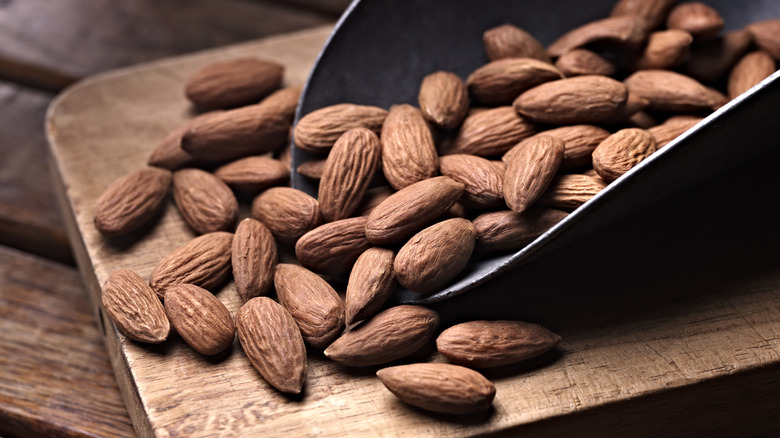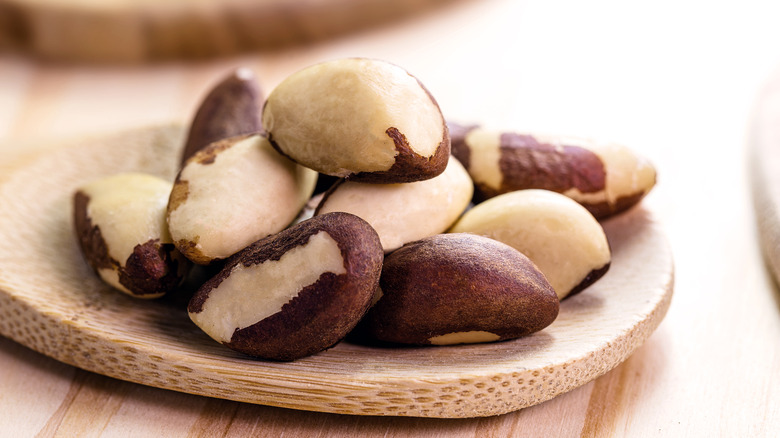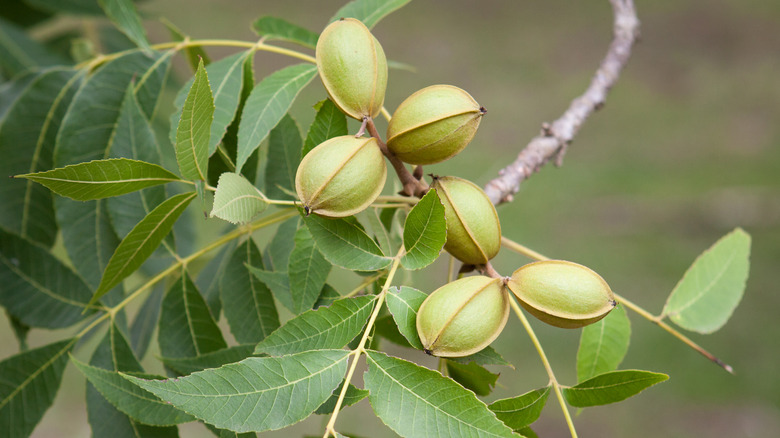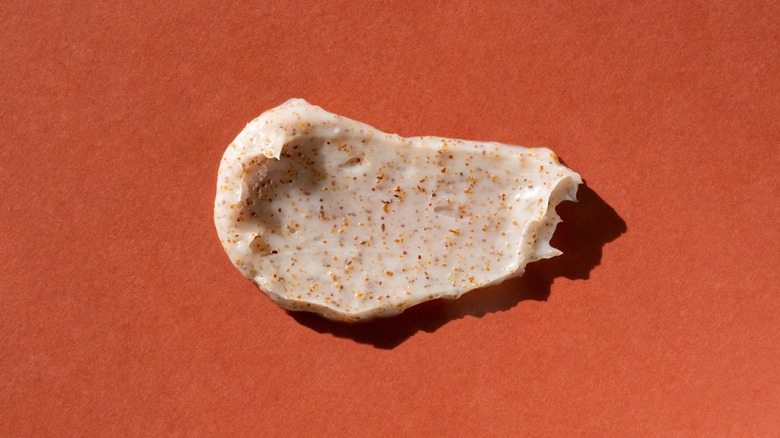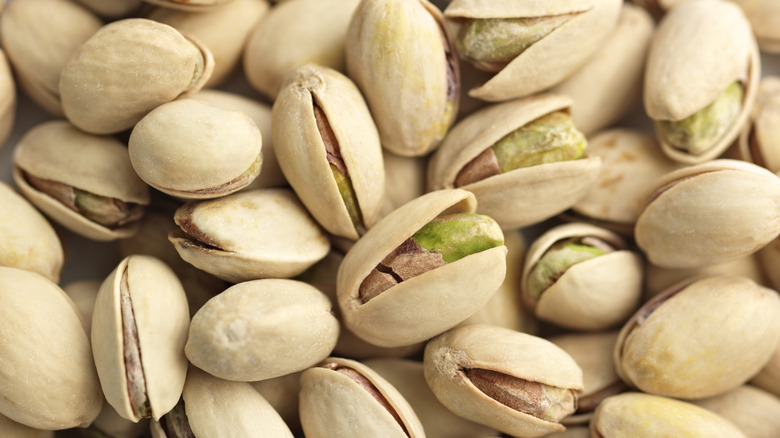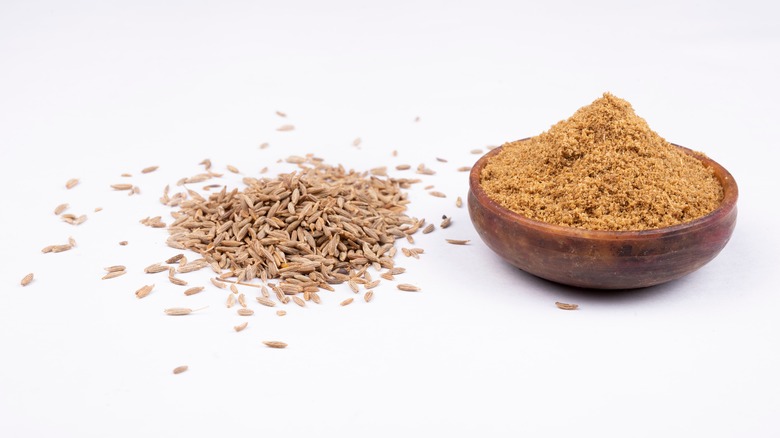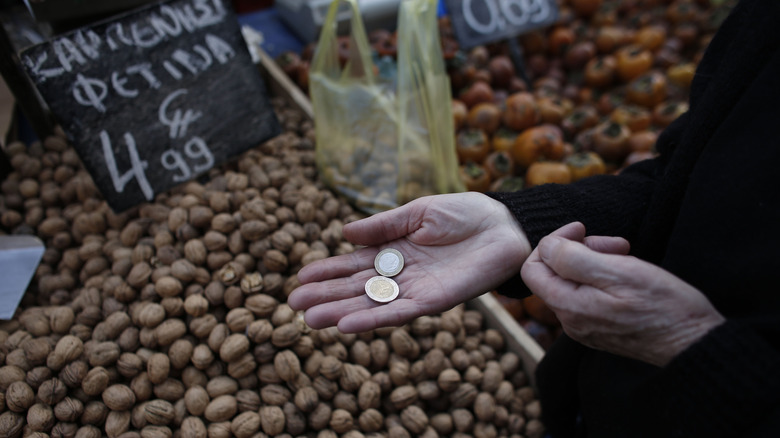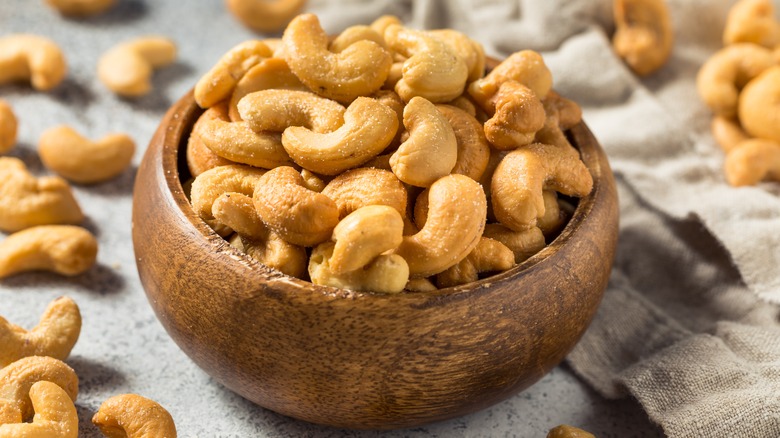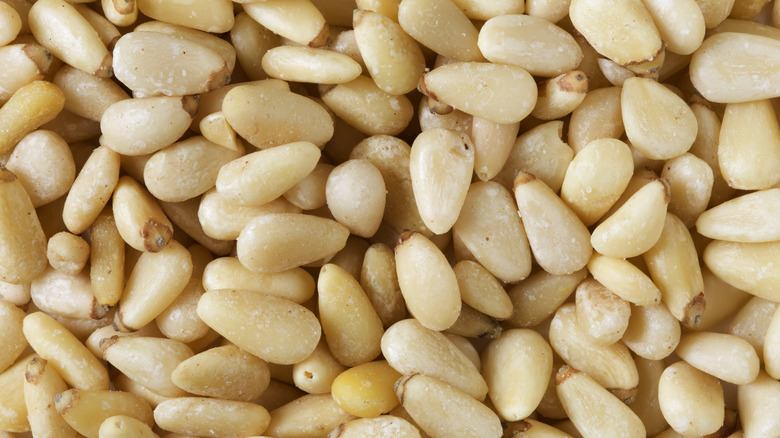Scandals That Shook The Nut Industry
Nuts are a healthy and tasty snack, with plenty of varieties to choose from. The terms nutty and earthy, in a culinary sense, are great descriptors of flavors that add depth and interest to a dish. Whether it's pine nuts, almonds, walnuts — you name it — nuts are a staple in the culinary industry and beloved snack food. Salty and crunchy, you can't really go wrong with a good assortment of nuts (as long as you're not allergic).
Surprisingly, the nut industry is bountifully riddled with scandal, intrigue, drama, and shocking secrets. The minds and actions of some of the higher-ups have left society in a position to question their ethics and wonder if those that oversee our food production can be trusted. Unfortunately, it seems that, in many cases, companies have proven that they may not be as trustworthy as we would like to think. From contaminated products to sketchy business transactions, here are some of the most ridiculous and shocking scandals that shook the nut industry. Fair warning — they may make you think twice before buying your next jar.
Peanut Corp owner snuck salmonella onto shelves
Perhaps one of the biggest nut-related scandals to date was that of the nefarious Stewart Parnell, the previous CEO of the Peanut Corporation of America. While peanuts are technically legumes, this scandal is too shocking to skip over. The drama began with a routine test for salmonella. Peanut manufacturing plants are required to test their product before releasing it to the public to ensure no illness-causing issues are present. In the case of Peanut Corp, they ran multiple failed tests, where every test came back positive for salmonella.
It is reasonable to expect that Parnell would withhold that product until the issue is resolved. You know, instead of knowingly poisoning people? Well, they ended up doing the most awful thing possible and intentionally forged documents to show that the products were salmonella-free. Peanut Corp then launched the clearly tainted product onto our shelves. As you can probably guess, over 700 cases of salmonella poisoning erupted across the nation shortly thereafter. In the end, Parnell's malicious negligence killed nine people. It sounds too evil to be true that Parnell intentionally and villainously chose to save profit instead of saving the health of his consumers. Thankfully, the secret emerged, and he and those involved were held responsible for the alleged attempt to poison the masses. Parnell is currently serving a 28-year sentence in prison.
Wild lies about walnut costs swept the industry
Diamond Foods touts the name of a flawless gemstone that stands for pure and true love. Unfortunately, its business practices have not met such a noble standard. Diamond Foods is a notable American snack company recognized for its premium nut products, notably the Diamond of California walnuts. Established in the early 20th century, the company gained fame for its range of nut-based snacks and culinary offerings. In a later development, Snyder's-Lance acquired Diamond Foods, incorporating its renowned products into its lineup. The company's heritage is linked with superior nuts and inventive snack creations but is not without scandal and intrigue. Back in 2011, Diamond Foods fell under scrutiny for some questionable money transfers and payments. Questions emerged about clients, unusually quick business expansion, and reports of unusual payments to growers.
As is the case with many large corporations, it seems that Diamond Foods fell into the trap of securing large bonuses for executives at the cost of the workers on the ground. With the suspicious transfer of large sums of money at bizarre times for their grower schedule, Diamond Foods found itself the source of a lawsuit. The Securities and Exchange Commission ended up charging the company with an accounting scheme to make up walnut costs in order to achieve a larger payout for their higher-ups. Needless to say, word got out and caused quite a rift in business for Diamond Foods.
Almonds came with a side of salmonella
Almonds, while a popular nut option today, were not always considered safe to eat. Originally, almonds as found in nature were quite poisonous, with the consumption of 50 or fewer being enough to kill an adult (from ISRN Toxicol). Wild almonds contain amygdalin, which is an unpleasant and bitter chemical. The scary part about amygdalin is that when you consume it, it has the potential to change into cyanide in the body (per Memorial Sloan Kettering Cancer Center). Luckily, almonds today have undergone a harvesting process that avoids this deadly process, but that doesn't mean manufacturers haven't dealt with deadly risks.
Blue Diamond is a leading agricultural cooperative renowned for its high-quality almond products. With a rich history dating back over a century, Blue Diamond has become a global leader in almond cultivation, processing, and innovation. The company's products include almonds, almond milk, and almond-based snacks, catering to health-conscious consumers, or so they claim. Unfortunately, Blue Diamond is not without a few health scares. In August of 2022, Blue Diamond was forced to recall over 347,600 pounds of their almonds due to a possible salmonella outbreak. Thankfully, they successfully completed the recall (unlike certain peanut corporations) and avoided what could have become a public health crisis. While it is comforting to know that some nut companies have our backs, it is still frightening to think that your almonds could have poisoned you with salmonella.
Brazil nuts were a cover for illegal deforestation
Brazil nuts are harvested from forests across the world, including Amazonian environments. Many parts of the Amazon forests are at high risk of deforestation, so there are multiple regulations and safeguards in place to ensure that deforestation is kept to a minimum, even with the harvesting and production of various products. The same rules apply to the harvesters of Brazil nuts, who are allowed a certain amount of timber processing per harvest. The scandal with Brazil nuts emerged when it was discovered that the nuts were an attempted cover to illegally take down more trees than they were allowed to.
Recent data indicated a concerning uptick in deforestation in Brazil, attributed partly to accelerated South American initiatives in utilizing the Amazon rainforest for extensive Brazil nut harvesting. This surge prompted questions about the effectiveness of Brazil's environmental safeguards in preserving the Amazonian biome in the face of mounting deforestation pressures. Specialized environmental prosecutors realized what was happening and quickly intervened. They found that while the individuals in question were permitted to take nuts from the particular forest areas, they were taking too much timber to warrant their extraction of Brazil nuts. In the end, they implicated 21 people, which unfortunately included several of the officials from the Department of Forestry and Wildlife of Tahuamanu. Those that were supposed to protect the Amazon forests ended up contributing to the destruction under the cover of Brazil nuts.
Pecans were picked illegally
Pecans are yet another nut that is popular around the world. Apparently, they are so popular that certain individuals were inspired to resort to theft to get their hands on them. Pecan theft ended up becoming such an issue in Mississippi that they passed legislation to crack down on the petty pecan thieves. Mississippi's agricultural branding program worked closely with pecan growers across the state to ensure that they received proper wages and accommodations for their hard work. Therefore, the state intervened when it was discovered that people were stealing pecans from farms across the state and hindering the profits of the hard-working growers.
The new laws that the Mississippi officials put into place came about in the form of a Senate bill. The bill ensured that any pecan thieves caught in the act would face increased penalties, fines, and punishments for their pecan crimes. This was done in the hopes of decreasing thievery and increasing safety and assurances for pecan farm owners. Hopefully, now, the pecan thieves will take a chill pill and allow the pecan growers to operate in peace.
Walnuts wreaked havoc in face wash
The St. Ives Apricot Scrub lawsuit revolved around allegations made by plaintiffs against Unilever, asserting two key points. First, the plaintiffs claimed that the inclusion of crushed walnut powder in the scrub led to skin damage in the form of tiny tears and rips from the rough inclusion of walnut fragments. The claim was that these micro-tears made skin more prone to infection and issues like irritation. Additionally, they contested the product's label claim of being non-comedogenic, suggesting that this assertion was inaccurate. The plaintiffs contended that the use of St. Ives as a facial exfoliant had the potential to cause lasting damage to the skin, outweighing any purported benefits.
While crushed walnut powder might seem innocuous due to its powder form, a dermatologist that was interviewed about the case suggested that finer walnut particles would lead to more powerful exfoliation. This perspective confirmed that potential over-exfoliation (aka, tears or rips in the skin) could, in fact, be attributed to the crushed walnut powder. Regarding the claim of non-comedogenicity, another consulted dermatologist clarified that products must undergo rigorous testing to earn the non-comedogenic label. Therefore, if a product advertises itself as non-comedogenic, it signifies that it has indeed passed such tests. While walnuts in your face wash may not have popped up as your first worry, apparently, it is another scandalous occurrence that has been known to occur.
Macadamia nuts led to erratic behavior
Macadamia nuts are known to be one of the most expensive nut options out there and are considered a special treat when given for free. Unfortunately, the macadamia nuts became a prompt for drama when an unkempt executive lashed out at an innocent flight attendant. Macadamia nuts rose in popularity in Korea after the incident, which led to their launch on privately-owned airlines like Korea Air. In 2014, the nuts led Korean Air to become the source of an in-house scandal. Heather Cho, the Vice President at the time of Korean Air and the daughter of Korean Air's CEO, apparently took her nepotism too seriously and transferred it to poor treatment of others. The overly entitled executive demanded that the plane return to the gate after takeoff/ Why? Because her macadamia nuts were served to her in a bag instead of in a porcelain bowl.
Understandably, the incident sparked public outrage and led to refreshed and more intense punishments for disruptive air passengers in South Korea. Heather Cho's actions violated aviation law and landed her a one-year stay in prison, of which she served five months. The flight attendant was awarded $20 million for resisting coercion to drop the case, along with an additional $30 million won as compensation for Cho's assaults and insults. In the end, Cho was dismissed from Korean Air, which seems reasonable. After all, lashing out over macadamia nuts is just a smidge ridiculous.
Almond milk is more water than almond
Blue Diamond almond milk faced a scandal involving allegations that the product did not contain as many almonds as its packaging and marketing suggested. The lawsuit contended that the packaging's images of almonds and the phrase "made from real almonds" were misleading, leading customers to believe they were purchasing a predominantly almond-based product. The lawsuit argued that the deceptive packaging deceived consumers, who believed they were buying healthy, premium almond milk.
The lawsuit compared Blue Diamond almond milk's almond content to recipes for homemade almond milk, which typically call for a ratio of one part almonds to three or four parts water, resulting in approximately 25-33% almond content. The false advertising lawsuit alleged that Blue Diamond's product contained a meager 2% almonds, with the majority being water, oil, and other filler ingredients. While the lawsuit did not specify the exact percentage deemed acceptable, it highlighted the alleged disparity between customer expectations and the actual almond content. In response, Blue Diamond defended its product. They pointed out that similar ratios are observed in other milk alternatives like soy and almond milk. The company indicated that the issue wasn't unique to their brand and acknowledged that water is a prevalent ingredient in most popular beverages. In the end, Blue Diamond remained free and clear. The general consensus was that customers could easily expect and understand the need for the existing almond-to-liquid ratio.
Petty theft of pistachios is a problem
A good mystery novel often starts with something going missing, as was the case with the theft of over 42,000 pounds of pistachios in central California. Law enforcement officials worked to unravel the mystery behind the disappearance of the pistachio nuts, an incident that gripped the region in 2021. The Tulare County sheriff's office announced that they had located the stolen pistachios in a tractor-trailer within a local parking lot. The alleged culprit, identified as 34-year-old Alberto Montemayor, had reportedly intended to resell the purloined nuts. This incident isn't the first time that the thriving nut industry in the area has been targeted. The pistachios were originally cultivated by the Touchstone Pistachio Company, which discovered the staggering loss during an audit. Agriculture detectives (which are apparently a thing) from Tulare County collaborated with investigators from neighboring counties to trace down the stolen nuts, ultimately finding them in the possession of Montemayor, who is employed as a trucker.
The pistachios were being repackaged into smaller bags for resale, an attempt to obscure their origins. The recovered nuts were returned to Touchstone while Montemayor was arrested and incarcerated. Theft within the nut industry has been a recurring issue, with robbers adopting tactics like impersonating truck drivers to pilfer and redistribute stolen nuts. The industry has fought back by implementing measures such as photographing and fingerprinting drivers, enforcing valid business permits for roadside sellers, and erecting fences around nut farms.
Peanuts are dangerously hidden as other ingredients
Britain's food supply network faced a significant crisis when authorities were called in to investigate an undisclosed use of nuts that could pose severe risks to individuals with allergies. This situation placed the UK's extensive nut and legume allergy sufferers in jeopardy. This time, concerns revolve around suspicions that cheaper peanuts and almonds were being covertly substituted for the more expensive cumin seeds in various dishes, all in an attempt to cut costs. Cumin, a staple ingredient in British cuisine, is widely employed to enhance flavor in diverse dishes, from soups to processed meals. Substituting it with allergenic peanuts or almonds can result in symptoms ranging from mild irritations to life-threatening situations.
If consumed by someone with allergies, both almonds and peanuts can lead to serious consequences, including cardiac arrest (from the Mayo Clinic). The Food Standards Agency (FSA) initiated an inquiry after instances of undeclared nut ingredients were discovered in products supposedly containing cumin. For instance, Morrisons' Fajita Meal Kit was recalled due to undeclared almond protein found in the "seasoning mix." While it remains uncertain whether this substitution was accidental or fraudulent, the potential risks have led to widespread concern. A new food crime unit was established by the FSA in response to the scandal and addressed the critical issue. Despite uncertainty about the extent and intention of this practice, the risk to public health remained a central concern.
Nuts are on the black market
The surprising presence of a black market for nuts, particularly in California's lucrative nut industry, has unveiled a new dimension of organized agricultural crime. As the state leads in almond, pistachio, and walnut production, it has also attracted criminal rings aiming to exploit the high value of these nuts. California's favorable growing conditions have propelled its status as a top nut producer, with almonds alone generating massive revenue. Yet, this success has made the industry a prime target for theft. Nuts lack serial numbers or QR codes, making them well-suited for illicit trade. Their durability and value further tempt criminals, with pistachios commanding higher prices per pound than other crops.
Despite growers' efforts to deter theft through surveillance cameras and specialized tags on trucks, criminals have become adept at hacking into trucking companies' systems to orchestrate large-scale thefts. The complex logistics involved in processing nuts, including cleaning, pasteurization, and roasting, provide ample opportunities for heists. And, the impact of nut thefts on farmers is substantial, as each load of nuts holds significant value. Losses from thefts can erode farmers' already thin profit margins, hindering hard-working growers. The rise of these black markets highlights the challenges of protecting valuable agricultural assets and reinforces the need for heightened security measures in the industry.
The inhumane catch to cashews
The cashew production industry, a vital component of global agriculture, harbors concerning ethical issues. Presently, Nigeria, India, and Vietnam stand as the primary cashew nut producers, collectively contributing more than half of the world's supply. However, the lucrative nature of this industry is overshadowed by questionable labor practices and worker exploitation. The cashew production process involves arduous manual labor, particularly in the shelling process. In countries like India, over one million workers laboriously shell cashews by hand, each producing around 175 pounds of nuts daily.
Tragically, these workers lack the necessary protective equipment to shield them from the harmful caustic chemicals present in cashew shells, which cause painful skin conditions and respiratory issues (from Healthline). Moreover, the subsequent roasting process exacerbates health hazards by releasing further chemicals into the air, leading to breathing problems and chronic coughing for those exposed. The human rights aspect of the industry takes a dark turn in Vietnam, where citizens with drug addictions are forced into inhumane labor conditions. This exploitation extends to cashew workers who lack protective gear, endure chronic pain, and suffer from injuries related to contact with the fruit's corrosive properties.
Poisonous pine nuts are a growing concern
The enigmatic phenomenon known as "pine nut mouth" continues to baffle scientists as they grapple with its elusive cause. First documented in 2000, a person in Belgium reported a persistently bitter aftertaste following pine nut consumption, claiming that the unpleasant taste can linger for up to two weeks. Pine nut mouth, which often discourages individuals from trying these tender nuts again, has sparked speculation about its origins. Some suspicions have centered around a Chinese variety of pine nuts called Pinus armandii, though conclusive evidence remains elusive. Scientists at the U.S. Food and Drug Administration embarked on a quest to solve the mystery by employing sophisticated techniques like gas chromatography and DNA testing. Despite their efforts, the nature of the issue took a surprising twist.
As it turns out, the complexity of pine nut sourcing poses a challenge to identifying the root cause. Pine nuts sold in the United States are often a blend of various species, including pinus armandii, rendering the chemical analysis more intricate. So, the next time you try pine nuts, you may be in for a bitter aftertaste depending on the source of the nut.


